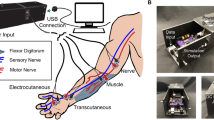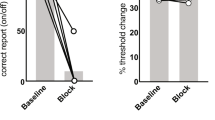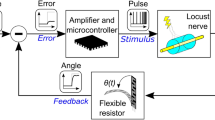Abstract
IT is well known that the release of a constricting cuff, which is cutting off the blood-supply to a part of a limb, may be followed by the complex sensation known as ‘pins and needles' but there has been some controversy as to which part of the nerve or its branches is giving rise to the nerve impulses. Lewis et al.1 and Zotterman2 believed that the region of the nerve lying under the cuff was mainly concerned, whereas Weddell and Sinclair3 argue that the sensation "is due to the stimulation of a proportion of the peripheral nerve endings in the area in which it is felt". Some new experiments to be described give results which appear incompatible with either of these views.
This is a preview of subscription content, access via your institution
Access options
Subscribe to this journal
Receive 51 print issues and online access
$199.00 per year
only $3.90 per issue
Buy this article
- Purchase on Springer Link
- Instant access to full article PDF
Prices may be subject to local taxes which are calculated during checkout
Similar content being viewed by others
References
Lewis, T., Pickering, G. W., and Rothschild, P., Heart, 16, 1 (1931).
Zotterman, Y., Acta Med. Scand., 80, 185 (1933).
Weddell, G., and Sinclair, D. C., J. Neurol., 10, 26 (1947).
Author information
Authors and Affiliations
Rights and permissions
About this article
Cite this article
GORDON, G. ‘Pins and Needles'. Nature 162, 742–743 (1948). https://doi.org/10.1038/162742a0
Issue Date:
DOI: https://doi.org/10.1038/162742a0
Comments
By submitting a comment you agree to abide by our Terms and Community Guidelines. If you find something abusive or that does not comply with our terms or guidelines please flag it as inappropriate.



